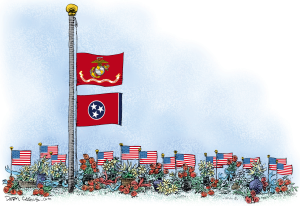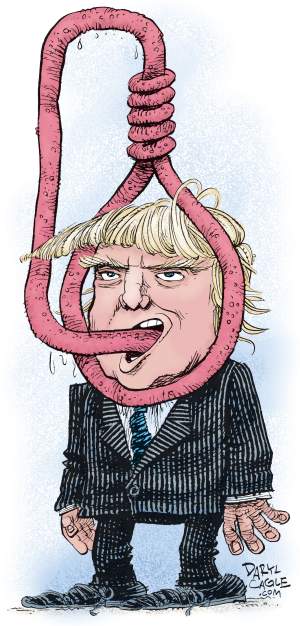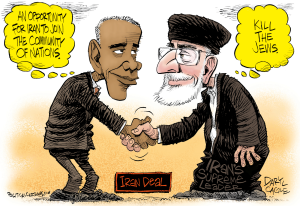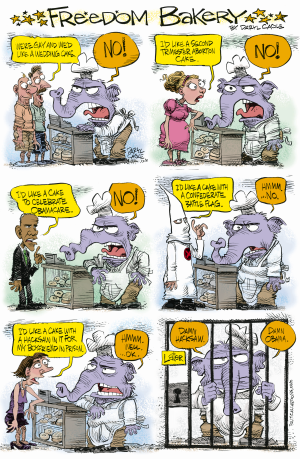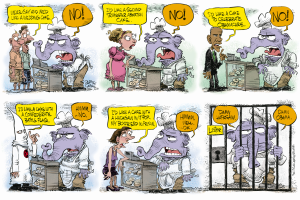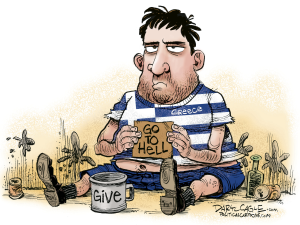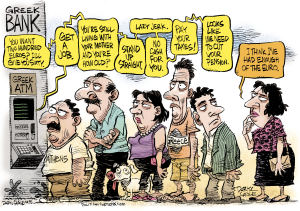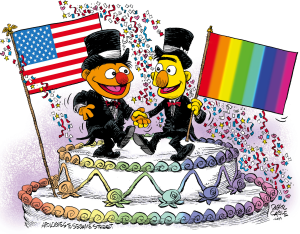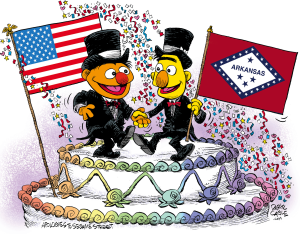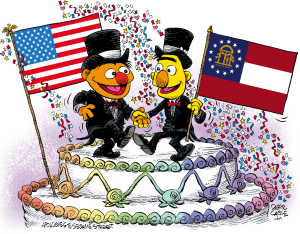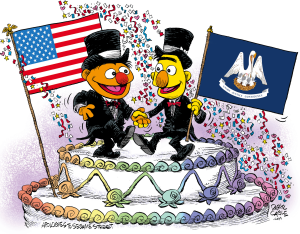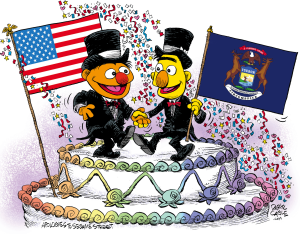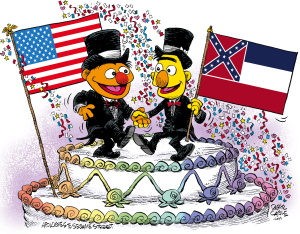
Great Hunter Obama
Backstabbing Pakistanis

Dead Osama bin Laden and the Birthers


?
Every time I open a newspaper I read another story about the decline of newspapers. Political cartoonists were the canaries in the newspaper-decline-coal-mine; our ranks have been shrinking for the past 30 years — but now the pace has quickened as only a few dozen editorial cartoonists are left, and they seem to be losing their jobs at a pace of about one per week.
Political cartoons won’t disappear. As long as there is a newspaper left, with a space for a cartoonist to fill, a cartoonist will step up to draw. What we’re seeing is the “McDonaldsization” of editorial cartoons. Like McDonalds, there aren’t a lot of choices on the menu, everything on the menu is pretty good, and everyone, everywhere, chooses from the same, few menu choices. We may soon be left with just a dozen political cartoonists, perhaps the best ones, drawing for all the newspapers — just as we all watch the same news on TV, buy the same products at Wal-Mart, and eat the same food at McDonalds.
To fans of political cartoons, the list of prominent political cartoonists who have recently lost their jobs is shocking. Here is a partial list:
Gary Brookins, The Richmond Times Dispatch (Va.). Buyout.
Tom Meyer, San Francisco Chronicle (Calif.). buyout.
Bill Day, The Commercial Appeal (Memphis,Tenn.). Laid off.
John Branch, San Antonio Express-News (Texas). Laid off.
David Horsey, Seattle Post-Intelligencer (Wash.). Newspaper closed, will continue to work for Web site.
Jim Borgman, The Cincinatti Enquirer (Ohio). Buy out.
Eric Devericks, The Seattle Times (Wash.). Laid off.
Lee Judge, The Kansas City Star (Mo.). Laid off, now freelances.
Don Wright, The Palm Beach Post (Fla.). Buyout.
Steve Greenberg, Ventura County Star (Calif.). Laid off.
Stuart Carlson, Milwaukee Journal-Sentinel (Wisc.). Buyout.
Ed Stein, Rocky Mountain News (Colo.), Newspaper closed. Continues to draw in syndication.
Drew Litton (Sports Cartoonist) Rocky Mountain News (Colo.). Newspaper closed. Continues to draw in syndication.
Ben Sargent, Austin American-Statesman (Texas). Buyout.
Brian Duffy, The Des Moines Register (Iowa). Laid off.
Bill Schorr, quit print syndication.
Bill Garner, The Washington Times (D.C.). Laid off.
Kevin “Kal” Kallaugher, The Sun (Baltimore, Md.). Laid off.
Patrick O’Connor, Daily News (Los Angeles, Calif.). Laid off.
Corky Trinidad, Honolulu Star-Bulletin (Hawaii). Died; position not refilled.
Dick Adair, The Honolulu Advertiser (Hawaii). Laid Off.
Dwane Powell, The News & Observer (Raleigh, N.C.). Now freelances.
Jim Lange, The Oklahoman (Oklahoma City, Okla.). “Early” retirement.
Chip Bok, Akron Beacon-Journal (Ohio). Buyout.
Peter Dunlap-Shohl, Anchorage Daily News (Alaska). Buyout.
Sandy Huffaker, retired from syndication.
Jake Fuller, The Gainesville Sun (Fla.). Laid off.
Dave Granlund, The MetroWest Daily News (Framingham, Mass.). Laid Off.
Paul Combs, left syndication after leaving The Tampa Tribune (Fla.); position not refilled.
Mike Shelton, The Orange County Register (Calif.). Laid off.
Gordon Campbell, Inland Valley Daily Bulletin (Ontario, Calif.). Laid off.
Richard Crowson, The Wichita Eagle (Kan.). Laid off.
Mike Peters, Dayton Daily News (Ohio). Cut back on the number of editorial cartoons he draws.
Ann Telnaes, quit print syndication to focus on animation.
David Catrow, Springfield News-Sun (Ohio). Left to work on other projects.
Daryl Cagle is a political cartoonist and blogger for MSNBC.com; he is a past president of the National Cartoonists Society and his cartoons are syndicated to more than 850 newspapers, including the paper you are reading. Daryl’s books “The BIG Book of Campaign 2008 Political Cartoons” and “The Best Political Cartoons of the Year, 2009 Edition” are available in bookstores now. Read Daryl’s blog at www.blog.cagle.com/daryl.
—
Daryl Cagle, Cartoonist for msnbc.com
http://cagle.msnbc.com
http://caglepost.com
Blog: http://blog.cagle.com/daryl
Twitter: dcagle
Not So Funny In China
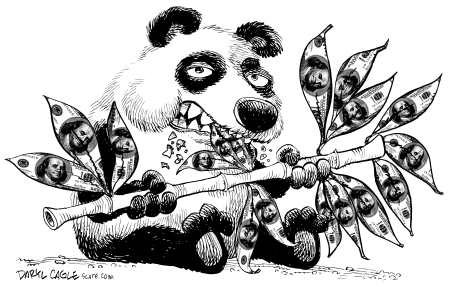
Not so Funny in China
I just got back from a speaking tour in China as part of a cultural exchange through the U.S. State Department, talking to college audiences about my political cartoons and what it’s like to be an editorial cartoonist in America.
The best measure of political freedom is political cartoons and whether cartoonists are allowed to draw their own leaders. Chinese cartoonists almost never draw their leaders, and my Bush-bashing cartoons seemed very foreign to Chinese audiences, who seemed genuinely concerned for my safety; they thought I was in danger from the politicians I lampooned. The questions were the same, wherever I went:
Q: Do your cartoons hurt your personal relationships with the politicians you draw?
A: No, I don’t have personal relationships with the people I draw.
Q: Do you worry that your drawings will hurt the reputation of someone you have drawn?
A: No, if one of my cartoons hurts the reputation of a politician that I am criticizing, then I am pleased. (Sometimes the crowd murmurs when I say this. It doesn’t seem to be what they expect me to say.)
Q: Do you ever apologize for your cartoons?
A: Sometimes, but only if I make an error or if the cartoon is misunderstood. Usually the people who are angry about a cartoon are the people I intend to make angry, and I am happy to make them angry. (The crowd murmurs at this answer, too.)
Q: Do you ever draw cartoons that are supportive of China?
A: No, I don’t draw cartoons that support anything. I just criticize. In America we have a special term for positive, supportive cartoons, we call them: “greeting cards.”
Q: Now that you have visited China, and have learned more about China, will you be drawing cartoons that support China?
A: Probably not.
Q: What do you think about the terrible things that Jack Cafferty from CNN said about China? What can be done to make CNN apologize for these remarks?
A: Most Americans don’t know Jack Cafferty and haven’t read about his remarks, but most Americans have a negative view of China and would probably agree with Jack Cafferty’s remarks. I wouldn’t expect CNN to apologize. (The students murmur.)
It’s interesting that CNN’s Jack Cafferty is a big, continuing issue in China; the students all seem to know about the guy and seem personally insulted by him.
The students ask whether I am excited about the Olympics (no, I’m not) and what I think about the earthquake (it was terrible, but I wish President Bush had responded to Hurricane Katrina as quickly as the Chinese government responded to the earthquake).
I learned what the Chinese think are funny — pigs and homosexuals. If I ever give a speech in China again, I’ll be sure to show all of my cartoons that feature pigs and homosexuals.
I didn’t show cartoons about China. I just wanted to show how I draw disrespectful cartoons about American leaders. That was enough to shock these audiences and show how different our press freedoms are. I was always asked how China is depicted in cartoons, and I answered that there are four symbols of China in international editorial cartoons: a panda bear, a Chinese dragon, the Great Wall, or the guy standing in front of the tank in Tiananmen Square –- the audience gasps –- many of the students have never seen the famous photo, and the subject of the Tiananmen Square “incident” is rarely discussed. At one speech, I mentioned the four symbols, the audience gasped, and one student jumped up, saying, “Oh! Oh! What kind of dragon?!”
I explained to the college kids about “censorship” in America, and that the government never censors cartoonists, but that freedom of the press belongs to the guy who owns the press and cartoonists often complain about their editors. This seemed to be a difficult distinction for them to grasp, in a country where the government owns or controls the press.
The Chinese have embraced capitalism; the country is booming, but the Chinese are eager to prove that economic freedom and political freedom are separate matters that don’t go together. The willingness of the Chinese to accept the restrictions on their press is shocking to my American sensibilities – just as my cartoons were shocking to the Chinese.
Daryl Cagle is a political cartoonist and blogger for MSNBC.com; he is a past president of the National Cartoonists Society and his cartoons are syndicated to more than 850 newspapers, including the paper you are reading. Daryl runs the most popular cartoon site on the Web at Cagle.msnbc.com. His book “The Best Political Cartoons of the Year, 2008 Edition,” is available in bookstores now, and he has a new book coming out this fall, “The BIG Book of Campaign 2008 Cartoons.” See Daryl’s cartoons and columns at www.caglepost.com.


